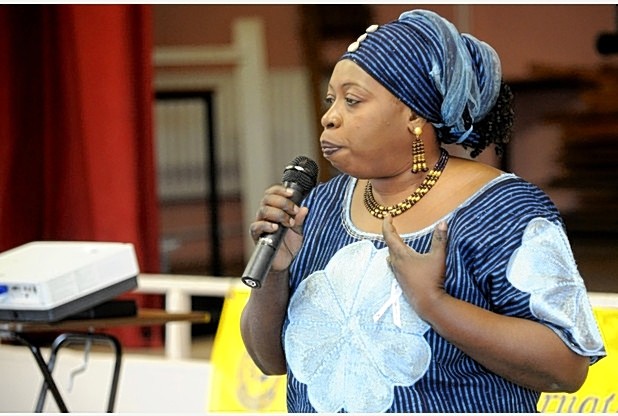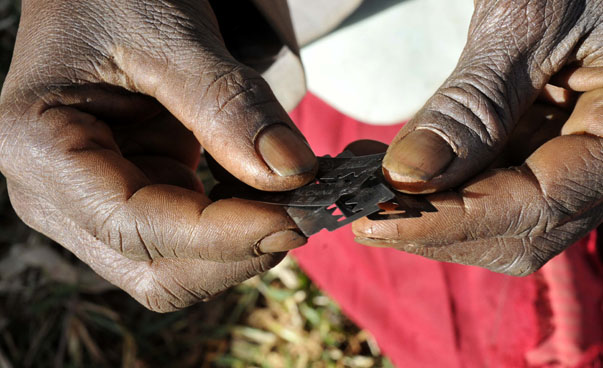“On the day that my mom cut my daughter, I knew I would not be able to do this. I heard my blindfolded daughter, crying and calling my name, but I couldn’t help her because I was the one holding her down to facilitate the cutting.”
Maimuna Jawo is a 40-year-old woman, originally from the village of Willingara in, Gambia. She currently lives in a house provided by the Home Office in the borough of Hounslow in west London. The 17 other bedrooms of the house are occupied mostly by women who, like her, have applied for asylum in the United Kingdom.
Maimuna was put on Detained Fast Track at Yarl’s Wood Immigration Removal Centre after her first claim for asylum. Being detained enabled her to meet with Movement for Justice, an organisation that helped build her case and get her a solicitor through Asylum Aid. Asylum Aid focuses on women’s asylum claims in particular because, in many cases, it is more difficult for them to get status.
Zoe Gardner, Communications Officer at Asylum Aid, explained why this is the case.
“A woman seeking asylum may be fleeing something like female genital mutilation (FGM), domestic violence or rape, none of which are easy to evidence. You do not get a certificate for being raped or being at risk of FGM. So women often rely simply on their own ability to tell their story and be believed.”
According to Asylum Aid, cultural and linguistic barriers, shame and the effect of trauma on memory can affect a woman’s ability to tell a story in a way that will be believed by Home Office caseworkers. Given this, the culture of disbelief in the Home Office works disproportionately against women making this sort of claim.
Escaping FGM
“I was in a lot of trouble when I was in my country,” Maimuna told the IPF.
When Maimuna’s mother prematurely passed away, she was the one who inherited the duty to perform FGM on the girls of her community. She came to the UK in 2009 and decided not to go back to her country – not even for her brother’s wedding.
“On the day that my mom cut my daughter, I knew I would not be able to do this. I heard my blindfolded daughter, crying and calling my name, but I couldn’t help her because I was the one holding her down to facilitate the cutting.”
That day, Maimuna promised herself she would do whatever it takes to never have to perform FGM.
Once on the UK soil, Maimuna went from house to house, attempting to find a place where she could sleep. Eventually, a Pakistani family agreed to host her. When Maimuna opened up to them about her story, the family urged her to seek asylum and gave her the phone number of the Home Offie.
“So I went to Croydon to do my screening interview and that’s when they told me that they were going to detain me.”
Yarl’s Wood Immigration Removal Centre
“I didn’t know what was happening,” Maimuna said.
“They told me I overstayed and they took me to Yarl’s Wood detention centre.”
Maimuna said that her phone and SIM card were taken away from her: “It was impossible for me to talk to anyone outside of the detention centre and to tell them where I was.
According to Anotinia Bright from Movement for Justice, “the Detained Fast Track process is nothing more than a set up to make the vast majority of cases fail”. But it was Maimuna’s recollection of the detention centre that made people realise just how terrible the centre was.
“Detention centres are worse than prison. When we’re sick the staffs do not believe us and the only medication we are given is Paracetamol. I know one of the women who got sexually assaulted by them, but nobody cares and nobody believe us.”
According to Maimuna, many of the women detained in Yarl’s Wood attempt to commit suicide and some of the women are sexually assaulted by the guards.
 Backlash from Gambia
Backlash from Gambia
Maimuna’s sister-in-law went to visit her in Yarl’s Wood before flying home to Gambia for her annual visit. When she got to Willingara, her sister-in-law was harassed with questions by the elders of the community. Although she told them that she didn’t know where Maimuna was, the community elders had a message for her.
“They told her, ‘When you go back there, make sure to find Maimuna and to tell her to come back’.”
The elders told Maimuna’s sister-in-law that they would force her to perform FGM on the young girls – whether or not Maimuna wanted to do it.
But her sister-in-law isn’t the only one who has felt the backlash from the community. Maimuna’s children, who are still in Gambia, were shunned by their neighbours too.
“They are staying in another village with different families because my people don’t accept them now,” Maimuna said. “They don’t want to look after them.”
An education lost because of FGM
“What made me angry was seeing my friends going to school when I was 12, but I couldn’t go because my mom was teaching me how to circumcise.”
Today the story repeats itself. Maimuna’s daughter does not go to school anymore because of the bullying that she experiences.
“Not only her actually, they’re bullying all my children because I left.”
Her daughter’s dream is to become a beautician because she believes that “making a girl pretty is far more better cutting her”.

Prisca Korein, a 62-year-old traditional surgeon, holds razor blades before carrying out female genital mutilation on teenage girls from the Sebei tribe in Bukwa district, about 357 kms (214 miles) northeast of Kampala, December 15, 2008. The ceremony was to initiate the teenagers into womanhood according to Sebei traditional rites. REUTERS/James Akena (UGANDA) – RTR22M64
So what is FGM?
According to the World Health Organisation, there are four types of FGM.
“In Gambia, they will cut you and use the blood coming out to seal the labia,” Maimuna explained.
“When you get married, you have to come back and they will cut you again, without any medications, to open the labia.”
The Iranian and Kurdish Women’s Rights Organisation (IKWRO) looks at FGM as a form of honour-based violence to control women’s sexuality.
“FGM is a violation of human rights,” says Sara Browne, Campaign Officer at IKWRO. “It is a brutal practice because girls have no control over it, nor say, and it is something that will affect them, physically and mentally for the rest of their life.”
FGM in the UK
FMG has been illegal in the UK since 1985. However, Sara explained that “a law on his own doesn’t do anything”. She noted that having a law in place without raising enough awareness makes the law ineffective.
“It’s recently with the media that we have had a huge rising profile of this issue and people are talking about it. With that comes difficulties because people worry about demonising communities, but that’s always the issue when you’re challenging anything that seems cultural.”
Maimuna continues to wait for an answer
As of today, Maimuna is still an asylum seeker.
Following two refusals, Maimuna’s third claim for asylum is currently with the Home Office. The Home Office usually answers the claims within six months, but a year has gone by already and Maimuna is still waiting for an answer.
“It might be ‘yes’, it might be ‘no’,” Maimuna says. “I don’t know what will happen if it is ‘no’.”
According to Sara, it is extremely difficult to get asylum in the UK. Having worked as an immigration officer, she offered an insight into what goes on with asylum claims.
“I felt like asylum seekers were perceived as liars. It’s a very lengthy and difficult process and I think immigration officers are sort of trained to have the mindset of saying ‘no’.”
According to Sylvia Chant, Professor of Developmental Geography and an expert on Gambia, if Maimuna is deported, it would be difficult for her to reacommodate herself in her community – especially if she comes from a family line specialised in this practice.
“It might also be difficult as a single woman to start life anew without family support,” Sylvia explained. “Especially given the limited openings for women in Gambian labour markets and their low earnings.”
For Maimuna, it is much simpler than that. She knows she will be forced to perform FGM if she goes back.
“It will be, ‘Either you do it, or you die’.”
The UK’s double standard
Asylum Aid sees a double standard in the way that women who are fleeing FGM are treated. Zoe explained:
“While we have seen commendable efforts from the government to eradicate the practice of FGM here in the UK, the same concern is not being shown to refugee women and girls at risk.”
The Girl Summit, held in London last July, focused particularly on FGM and child and forced marriage.
“A lot of big statements have been made there about FGM,” said Sara.”But I will take those words with caution because when it comes to immigration, it’s a whole new ball game.”
According to Zoe, politicians make a big noise about FGM being a “disgrace to the country”, but are then happy to return women and young girls to countries where the practice is legal and “condoned by all levels of society”, by arguing that they are “not truly at risk” if they return to their country.
“If the government wants to protect women and girls from FGM, we have to stop sending them back to where they will face it.”
Looking ahead
Maimuna says she would have never imagined having to go through all those obstacles while seeking asylum in the UK. If she is finally granted asylum, Maimuna would like to devote her life to campaigning against FGM.
“I would do it again because I believe in the fight against FGM. If we start with educating the next generation about its dangers, I believe one day FGM will die.”

